Maksim Oreshkin: how ''black box'' suddenly became ''Putin’s favourite''
Russian political experts about a sudden media rise of the young technocrat
An unexpected ''favourite'' appeared in the register of Vladimir Putin's successors at the end of the last week – this is how Bloomberg characterised 35-year-old Minister of Economic Development of Russia Maksim Oreshkin. He was to arrive in Kazan on business on 28 August to hold a meeting to increase labour productivity and employment of the population. However, in the end, it was only a video conference from Moscow about this topic.
Realnoe Vremya asked famous Russian political experts how the young minister deserved such an honourable role and, most importantly, whether the very president of the Russian Federation knows about it.
-
-
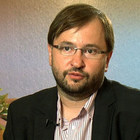
Mikhail Vinogradov political expert, president of Petersburg Politics fund
-
In autumn 2016, many people thought that Oreshkin's appointment was a step to mortify the Ministry of Economic Development, its further merger with the Ministry of Finance. But it did not happen in the end and even was forgotten somehow. And today with the help of Bloomberg everybody detected that the functionary suited the existing system quite well. He is incriminated for preparing some economic programmes. People are looking for an explanation of the career success. We can agree with the commentators that Oreshkin has settled and found a niche for himself during this year, has been among prospective workers, though there have not been made any bright steps in public.
-
-
-
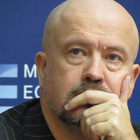
Andrey Kolyadin political expert
-
I know Maksim Oreshkin indirectly. His colleagues speak about him like a young, smart, bright expert who is good at economics and finance. Is it enough to become ''Putin's favourite''? No.
One can become Putin's favourite having lived with him for many years and recommended oneself a sensible person, reliable and safe. And it will be seen in trust in the person. And that's it. When people are speaking about new favourites today, I feel a trap. As soon as somebody is announced a favourite or successor, crowds of rivals rush and tear him apart like piranhas. This is why the smart, young and prospective young guy needs to be left in peace, without cliché and hackneyed phrases on his forehead.
He travels, does his job, doesn't disappoint his colleagues and the president, and thank God… We don't need to look for other backgrounds and stories here.
-
-
-
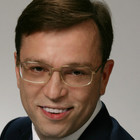
Nikita Krichevsky doctor of economics, professor, head researcher of the Institute of Economics of the Russian Academy of Sciences
-
Those who more or less know the situation understand that Maksim Oreshkin is no ''Putin's favourite'' and can't be him. Having announced it, Bloomberg spread a false story and provocation. As a rule, it doesn't spread information about Russia without a reason. It was a provocation towards Oreshkin to destabilise the power centres acting in the Russian politics.
The main mental quality of Putin's outlook is that he is a statesman. If Oreshkin were a state worker or statist as we are talking about the economy, we would hear it in his rhetoric and saw it in his decisions. Does he support, for instance, stricter currency regulation down to the introduction of a fixed rate of the national currency like in China? No, on the contrary, he is for quite a restricted interference of the state in the market.
Not Putin is behind Oreshkin but a narrow liberal group of people who are orientated to officials of the Central Bank, Sberbank, etc. Those who define the economic policy in the country wrongly. In addition, the very Ministry of Economic Development of Russia is an empty structure that has been remembered in the last years for nothing but numerous slips (and they continue under Oreshkin as well) and scandals with the Federal Agency for State Property Management that is affiliated to it.
And ''Putin's favourites'' should be looked among regional leaders whom he visits and expresses his support.
-
-
-
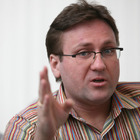
Evgeny Minchenko political expert, head of Minchenko Consulting
-
Where does this publication of Bloomberg come from? I think the explanation here is very simple. There is a competition of different strategies made by Boris Titov, Aleksey Kudrin and Maksim Oreshkin. In fact, these strategies are 60-70% similar. But they have differences that can be often conditioned by quite serious financial interests. So I think the first version of the false story titled ''Putin's Favourite'' is aimed to do harm to Oreshkin personally, make him a target for attacking and, consequently, cause problems. Because while executing his functions, he crosses somebody, so to speak. The second version is to hit his economic strategy. Or these blows are parallel.
Bloomberg feels fine here because its publications cause great excitement. The company is unlikely to have been given money – somebody just spilt the beans and they published it with pleasure. Moreover, judging by texts about Russia, they don't know our domestic situation very well.
It is difficult to evaluate Oreshkin's management qualities, he needs to demonstrate himself somehow first. Now it is quite difficult to demonstrate oneself. In our system Politbureau 2.0, he is now the ''Central Committee'' members, that's to say, he is not even a candidate to become a member of the political bureau. In addition, he is not a member of the political bureau. We can't say the ministry blossomed somehow under him, especially considering that demoralising atmosphere that reigned there after Aleksey Ulyukaev's arrest. Actually, this person is a ''black box''.
-
-
-
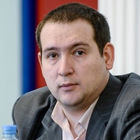
Mikhail Neizhmakov head analyst of the Agency of Political and Economic Communications
-
It is difficult to consider the functionary's positions separately from possibilities of his ministry. But now there are not signs of a real expansion of instrumental possibilities of the Ministry of Economic Development that Maksim Oreshkin names. What is more, several authorities of this ministry switched to other structures. For instance, in April 2017, the functions of the MED on the purchase of goods, works and services to provide state and municipal needs were given to the Russian Ministry of Finance. In fact, the ancient trend to expand possibilities of the latter affects here. Probably the current ratio of the instrumental influence between the Ministry of Finance and MED can conserve until the eve of the presidential elections. This is why now it is probably early to speak about big changes of Maksim Oreshkin's positions in the apparatus in the short run.
-